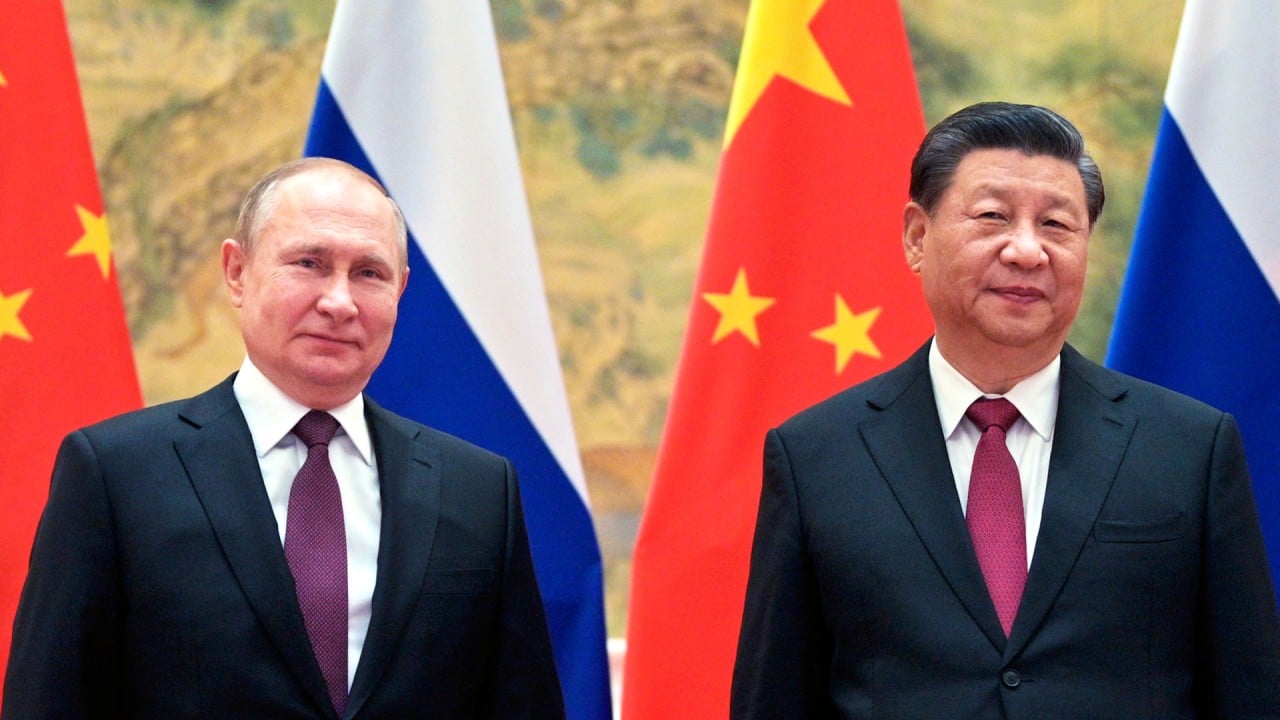
02:54
China’s delicate position on Russia-Ukraine crisis and its opposition to Western sanctions

Russia’s invasion of Ukraine is an ideological confrontation that threatens to make the world more polarised, while Washington’s sanctions blitz on Moscow could backfire causing a US dollar crisis and financial disaster, one of China’s top policy advisers says.
In a newly-published speech, David Daokui Li, head of Tsinghua University’s academic centre for Chinese economic practice and thinking, said the war could lead to the formation of three major geopolitical blocs and stir another global financial crisis.
“The Russia-Ukraine crisis has originated from decades-long concern among Western countries about different ideologies,” said Li, who is also a member of the Chinese People’s Political Consultative Conference.
“The struggling globalisation process could change directions and the global economy could become fragmented with ideologically-close countries forming their own economic, trade and investment blocs.”
To prepare for growing risks, the world’s second largest economy should position itself as a global hub for yuan-denominated financial products to lure overseas investors and establish more international organisations to strengthen international influence, he said.
Li, who received his PhD from Harvard University and was a member of staff at the University of Michigan in the 1990s, is an expert in China’s development theory.
His keynote speech, made at a closed-door symposium titled “China and the World Under Dramatic Changes” on March 31, partly explains Beijing’s refusal to denounce the Russian invasion, despite mounting Western pressure.
Participants of the symposium included Renmin University international relations professor Jin Canrong; Ni Feng, head of the American studies institute at the Chinese Academy of Social Sciences; and Wang Wen, president of Chongyang Institute for Financial Studies.
The full text of Li’s speech was only made public on Wednesday.
China has called for diplomacy and negotiation to solve the Ukraine crisis, seeking to maintain normal trade relations with both Russia and Ukraine. It abstained from voting on a UN Security Council resolution that condemned the Russian invasion at the end of February, and voted against a UN General Assembly resolution to suspend Russia from the Human Rights Council earlier this month.
On Monday, vice-foreign minister Le Yucheng hailed the “resilience” of China’s ties with Russia.
“No matter how the international situation evolves, China will, as always, strengthen strategic coordination with the Russian side to achieve win-win cooperation and jointly safeguard common interests,” he told Russian ambassador Andrey Denisov in Beijing.
Chinese imports of Russian crude oil dropped 14.1 per cent from a year earlier to 6.39 million metric tonnes in March, but the value rose 29.9 per cent, year on year, to US$4.58 billion, customs data showed.
The value of Russian coal imports rose 29.2 per cent to US$565 million, while the value of Russian liquefied natural gas purchases doubled to US$239.8 million.
In his speech, Li said the world could be divided into three major blocs with separate supply chains, including one led by the United States, a European market centred on Germany and France, and one revolving around China that included Belt and Road countries.
He said global finance could also become more polarised and China should position itself as an international financial centre.
“A new international financial crisis with the epicentre in the United States could arrive earlier than expected,” Li said, hinting at the need for many countries to trim US dollar assets. “Such a crisis could be accelerated by the Russia-Ukraine conflicts.”
China holds more than US$1 trillion of US treasury bills and many of its foreign exchange assets are denominated in US dollars.
However, concern is rising about the safety of the assets after Western countries froze those owned by the Russian central bank.
Government advisers at the symposium called for further economic reform and market opening to defend globalisation.
They said the government needs to improve the business environment at home, sharpen the competitiveness of Chinese companies and form a unified domestic market.
Additional reporting by Orange Wang